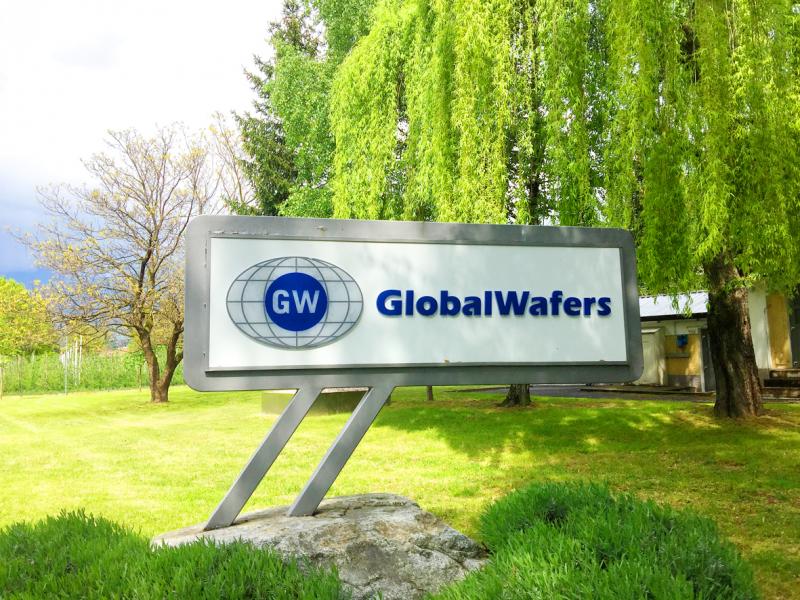GlobalWafers Co (環球晶圓) failed to reach a breakthrough in a last-ditch bid to salvage its planned takeover of Siltronic AG, likely spelling the collapse of the US$5 billion deal.
The Taiwanese technology company did not resolve the government’s concerns during a private meeting between GlobalWafers chairwoman Doris Hsu (徐秀蘭) and German Federal Ministry for Economic Affairs and Climate Action State Secretary Udo Philipp, people familiar with the matter said.
Siltronic shares tumbled as much as 4.7 percent on the news on Friday, extending the stock’s decline for the year to more than 20 percent.

Photo: Grace Hung, Taipei Times
While the ministry continues to examine the deal, approval is not likely by tonight, when a deadline for GlobalWafers to receive all necessary approvals ends, said the sources, who asked not to be identified because the information is private.
Spokespeople for GlobalWafers and Siltronic declined to comment. A spokesperson for the German economy ministry said that the review is ongoing, declining to comment further.
The meeting was likely the Taiwanese firm’s final opportunity to convince Germany to back the deal. The company had already offered the government special voting rights via a “golden share,” as well as ways to undo the purchase or sell back key assets in Munich-based Siltronic.
GlobalWafers said on Thursday that the deal has a chance to be approved as legal options remain available to address any concerns. The statement came a day after reports that Germany is likely to allow today’s deadline to lapse without granting approval, a move that could derail the proposed deal.
Global chip takeovers have faced increasing headwinds as governments have begun to treat semiconductor technologies and supply chains as national security issues. Authorities were put on heightened alert after a prolonged shortage of microelectronics roiled the auto industry and undermined economic recoveries in the later parts of the COVID-19 pandemic.
Nvidia Corp is preparing to abandon its purchase of British chip company Arm Ltd from Softbank Group Corp after drawing backlash from regulators and making little to no progress in winning approval for the US$40 billion deal, reports said this week.
During the process, Nvidia’s bid faced a national security review in the UK.
However, other deals have managed to win approval. Chinese regulators approved Advanced Micro Devices Inc’s purchase of Xilinx Inc, clearing the way for one of the largest deals in the global semiconductor industry.

TARIFFS: The global ‘panic atmosphere remains strong,’ and foreign investors have continued to sell their holdings since the start of the year, the Ministry of Finance said The government yesterday authorized the activation of its NT$500 billion (US$15.15 billion) National Stabilization Fund (NSF) to prop up the local stock market after two days of sharp falls in reaction to US President Donald Trump’s new import tariffs. The Ministry of Finance said in a statement after the market close that the steering committee of the fund had been given the go-ahead to intervene in the market to bolster Taiwanese shares in a time of crisis. The fund has been authorized to use its assets “to carry out market stabilization tasks as appropriate to maintain the stability of Taiwan’s

STEEP DECLINE: Yesterday’s drop was the third-steepest in its history, the steepest being Monday’s drop in the wake of the tariff announcement on Wednesday last week Taiwanese stocks continued their heavy sell-off yesterday, as concerns over US tariffs and unwinding of leveraged bets weighed on the market. The benchmark TAIEX plunged 1,068.19 points, or 5.79 percent, to 17,391.76, notching the biggest drop among Asian peers as it hit a 15-month low. The decline came even after the government on late Tuesday authorized the NT$500 billion (US$15.2 billion) National Stabilization Fund (國安基金) to step in to buoy the market amid investors’ worries over tariffs imposed by US President Donald Trump. Yesterday’s decline was the third-steepest in its history, trailing only the declines of 2,065.87 points on Monday and

TAKING STOCK: A Taiwanese cookware firm in Vietnam urged customers to assess inventory or place orders early so shipments can reach the US while tariffs are paused Taiwanese businesses in Vietnam are exploring alternatives after the White House imposed a 46 percent import duty on Vietnamese goods, following US President Donald Trump’s announcement of “reciprocal” tariffs on the US’ trading partners. Lo Shih-liang (羅世良), chairman of Brico Industry Co (裕茂工業), a Taiwanese company that manufactures cast iron cookware and stove components in Vietnam, said that more than 40 percent of his business was tied to the US market, describing the constant US policy shifts as an emotional roller coaster. “I work during the day and stay up all night watching the news. I’ve been following US news until 3am

TARIFF CONCERNS: The chipmaker cited global uncertainty from US tariffs and a weakening economic outlook, but said its Singapore expansion remains on track Vanguard International Semiconductor Corp (世界先進), a foundry service provider specializing in producing power management and display driver chips, yesterday withdrew its full-year revenue projection of moderate growth for this year, as escalating US tariff tensions raised uncertainty and concern about a potential economic recession. The Hsinchu-based chipmaker in February said revenues this year would grow mildly from last year based on improving supply chain inventory levels and market demand. At the time, it also anticipated gradual quarter revenue growth. However, the US’ sweeping tariff policy has upended the industry’s supply chains and weakened economic prospects for the world economy, it said. “Now